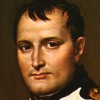Quotations by:
Napoleon Bonaparte
Do you know, Fontanes, what most amazes me in the world? The inability of force to maintain anything at all. There are only two powers in the world: the sword and the mind. In the long run, the sword is always defeated by the mind.
One should never forbid what one lacks the power to prevent.
Napoleon Bonaparte (1769-1821) French emperor, military leader
(Attributed)
An aphorism he frequently used. See Sophocles.
Lead the ideas of your time and they will accompany and support you; fall behind them and they drag you along with them; oppose them and they will overwhelm you.
Napoleon Bonaparte (1769-1821) French emperor, military leader
(Attributed)
(Source)
Quoted, unsourced, in Jules Bertaut, Napoleon: In His Own Words [Virilités, maximes et pensées de Napoléon Bonaparte], ch. 4 (1916) [tr. Law and Rhodes].
In war, three quarters turns on personal character and relations; the balance of manpower and materials counts only for the remaining quarter.
Napoleon Bonaparte (1769-1821) French emperor, military leader
Observations sur les affaires d’Espagne (27 Aug 1808)
Also translated: "In war, moral considerations make up three-quarters of the game; the relative balance of manpower accounts only for the remaining quarter." "Even in war moral power is to physical as three parts out of four." “Morale is to material as is the ratio of three to one.”
From the sublime to the ridiculous is but a step.
Napoleon Bonaparte (1769-1821) French emperor, military leader
Comment to the Abbé du Pradt (10 Dec 1812)
(Source)
During the retreat from Moscow, a repeated comment during a discussion with one of his ambassadors. Quoted by Archibald Alison, History of Europe from the Commencement of the French Revolution in 1789, to the Restoration of the Bourbons in 1815, Vol. 16, ch. 73 (1842). See also Paine.
Alt. trans.:
- "There is but one step from the sublime to the ridiculous."
- "There is only one step from the sublime to the ridiculous."
- "From the sublime to the ridiculous there is but a step."
Strategy is the art of making use of time and space. I am less chary of the latter than the former. Space we can recover, lost time never.
The barbarous custom of having men beaten who are suspected of having important secrets to reveal must be abolished. It has always been recognized that this way of interrogating men, by putting them to torture, produces nothing worthwhile. The poor wretches say anything that comes into their mind and what they think the interrogator wishes to know.
Napoleon Bonaparte (1769-1821) French emperor, military leader
Letter to Louis Alexandre Berthier (11 Nov 1798), in Correspondence Napoleon, Vol 5, #3605 [ed. Henri Plon (1861)]
(Source)
All great events hang by a single thread. The clever man takes advantage of everything, neglects nothing that may give him some added opportunity; the less clever man, by neglecting one thing, sometimes misses everything.
It is only a step from victory to disaster. My experience is that, in a crisis, some detail always decides the issue.
Napoleon Bonaparte (1769-1821) French emperor, military leader
Letter to Tallyrand (7 Oct 1797)
(Source)
Napoleon's Letters [tr. J. M. Thompson (1934)]
He who fears losing his reputation is sure to lose it.
Napoleon Bonaparte (1769-1821) French emperor, military leader
Letter to the Executive Directory (16 Apr. 1797)
The Bonaparte Letters and Despatches, Vol II (1846), p. 299 "The Third Plan": "But he who fears to lose his glory is sure to lose it."
A consecutive series of great actions never is the result of chance and luck; it is always the product of planning and genius. … Is it because they are lucky that they have become great? No, but by being great, they have been able to master luck.
I do not see in religion the mystery of the incarnation, but the mystery of the social order; religion attaches to heaven an idea of equality that stops the rich from being massacred by the poor.
[Quant à moi, je ne vois pas dans la religion le mystère de l’incarnation, mais le mystère de l’ordre social; elle rattache au ciel une idée d’égalité qui empêche que le riche ne soit massacré par le pauvre.]
Napoleon Bonaparte (1769-1821) French emperor, military leader
Statement (4 Mar 1806)
(Source)
Quoted in Opinions de Napoléon sur divers sujets de politique et d'administration, recueillies par un membre de son conseil d'état (1833).

